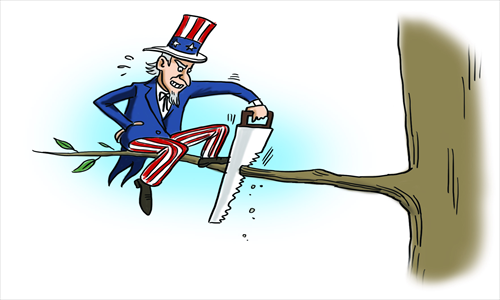US law ruins chance of fair competition

In late March, the US passed Section 516 of the Consolidated and Further Continuing Appropriations Act, prohibiting government agencies from acquiring Chinese IT products. Section 516 will negatively impact the operations of both US and Chinese IT companies; it has already incited criticism from both sides of the Pacific and will chill bilateral trade and investment.
While the legislation only restricts four US federal departments, namely the Commerce and Justice Departments, the National Science Foundation and NASA, from purchasing IT equipment, the effects will likely cascade into other federal agencies.
During congressional negotiations regarding federal agency funding, the prohibition was slipped in with little debate. US authorities claim that Chinese IT products threaten national security, an accusation that the Chinese government refutes.
However, the law also seems to be a product of efforts to insulate US IT companies from competition by effectively excluding Chinese companies from the world's most advanced IT market. While the law targets Chinese enterprises, the likely effects of Section 516 will also hamper US IT companies.
Ten US business associations, including the US Chamber of Commerce and the US Council for International Business (USCIB), criticized the prohibition for vague language and cumbersome implementation.
The USCIB argues that product security depends on how the product is made and utilized, rather than where it comes from and who manufactured it.
They state that geographic restrictions set a "counterproductive precedent that could have significant international repercussions and put US-based global IT companies at a competitive disadvantage in global markets."
Many US IT companies source components in China or from Chinese companies located outside China. These firms will face increased costs because the US government will require burdensome risk assessments and supply chain verifications for its IT vendors.
Consequently, companies with diversified supply chains across the globe may find their US government sales delayed or canceled.
And many US firms have production facilities in China, which receive local Chinese government support in the form of subsidies and tax incentives. The new law potentially bars these companies from selling to the US government.
The law could lead China to implement retaliatory measures, which would exclude US companies from bidding on Chinese government procurement contracts.
US IT companies have much to lose. China has the largest telecommunications market in the world, having reached a milestone of 1 billion mobile subscribers in 2012.
Some estimate that the total government procurement market in China is over $1 trillion and growing at over 20 percent a year.
Access to this large market is the reason why getting China to agree to join the WTO Government Procurement Agreement (GPA) has been a major policy priority for the US.
Nonetheless, Section 516 will hinder this goal.
While several aspects of Section 516 could be challenged for violating WTO rules, its reliance on a national security clause with scant need for transparency, coupled with an onerous burden of proof, are the most troubling. They could potentially undermine the WTO GPA itself.
Other countries, including China, now have a road map for excluding the US IT industry from their procurement markets by implementing similar restrictions.
The US government and industry would undoubtedly protest if their companies were subject to positive vetting for eligibility by security agencies.
Competitors of US IT companies from Europe, Japan and elsewhere in East Asia will be the beneficiaries of any reciprocal actions by China.
Section 516 sets an unfortunate precedent that has the potential to undermine the WTO GPA and raise tensions in Sino-US trade relations.
For a global industry such as IT, these developments have generated significant headwinds. While the law may boost a few firms in the short term, in the long run, it will harm manufacturers on both sides of the Pacific.
This article was contributed by the news portal asiatradewatch.com, a site dedicated to providing an Asian perspective on trade disputes between the emerging countries of Asia-Pacific and developed markets. opinion@globaltimes.com.cn